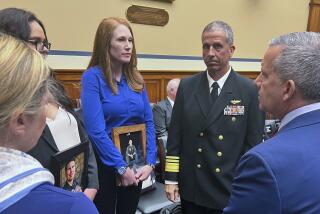Boeing Receives Stinging Report on Super Hornet
- Share via
WASHINGTON — Flaws in the development of the newest version of the FA-18 E/F Super Hornet fighter could jeopardize an $8.8-billion Boeing Co. contract to continue early production of the jet, according to a congressional report.
The General Accounting Office, the audit arm of Congress, said it identified 84 deficiencies in the FA-18 E/F Super Hornet, the latest version of Boeing’s most important military aircraft program.
The problems could cause the plane to fail six months of testing needed to trigger the five-year contract, the report said Tuesday. The GAO had made a similar warning in a report in March.
Boeing’s main subcontractor on the FA-18 program is Los Angeles-based Northrop Grumman Corp., which builds about 40% of the aircraft at its facilities in El Segundo and Hawthorne. About 2,000 workers produce the planes’ fuselages and twin vertical tails, and install many of its internal components.
Raytheon Co.’s sensors and electronic systems division in El Segundo also builds the radar for the FA-18.
Testing in the $46-billion program, the Pentagon’s second-most expensive, could lead to full-scale production of the Super Hornet next March. A successful test also would allow Seattle-based Boeing to sell an export model of the plane, which could add billions of dollars in sales, Boeing said.
“According to the Navy, the FA-18 E/F is meeting all performance requirements,” wrote the GAO. “We do not agree.”
The Navy and Boeing acknowledged in January that the plane faced a “medium” risk of failure, according to the GAO report.
The Super Hornet will be the Navy’s top aircraft carrier-based fighter-bomber. The Navy plans to buy as many as 548 aircraft at $55 million each.
The Super Hornet’s deficiencies, documented in 4,000 hours of testing, are related to its ability to accelerate, turn, climb, roll and detect incoming enemy missiles during combat maneuvers, the GAO said.
The Navy’s operational-test schedule doesn’t include enough time to correct the deficiencies and test them before the production decision is made, the GAO said. The GAO recommended that the Defense Department “defer multiyear funding until all corrections have been incorporated into the aircraft design and successfully tested.”
The Pentagon and Boeing took issue with the GAO, the audit arm of Congress.
The Pentagon’s director for strategic and tactical systems, George Schneiter, wrote to the GAO to say, “There are no deficiencies currently identified that would require a major redesign of the aircraft or are serious enough to warrant not awarding a multiyear contract.”
Boeing has “a great deal of confidence in the Super Hornet,” said spokeswoman Ellen LeMond-Holman. Jim Hart of Northrop Grumman declined to comment.
The Navy is asking for congressional approval to spend $2.8 billion on 36 Super Hornets in fiscal 2000. The purchase would be the first of a multiyear contract that locks in five years of production for Boeing’s most profitable fighter program, based in St. Louis.
Boeing shares rose 19 cents to $42.75 Wednesday on the New York Stock Exchange.
More to Read
Inside the business of entertainment
The Wide Shot brings you news, analysis and insights on everything from streaming wars to production — and what it all means for the future.
You may occasionally receive promotional content from the Los Angeles Times.










